- Home
- Juliet Marillier
Wolfskin Page 16
Wolfskin Read online
Page 16
The wind changed. Still it blew fiercely, sending the boats fleeing before it like specks of foam on a flood-swollen stream, yet now there seemed an eerie purpose behind it, for they were driven on a course that veered past small, flat islands and skirted the shores of larger ones where signs of settlement showed in wandering sheep and the smoke from cottage fires. North they were driven, then south, then westward again, and the rain cleared, and it became apparent that this strange intervention of the gods had carried them through broad ocean firths into the very heart of this group of grass-clad isles; they had indeed reached the destination Ulf had intended for them, and now sailed westward into a sheltered bay in whose waters two small islands lifted low, grassy forms above the sea. These islets were fringed by spreading rock shelves, and here rested many seals, watching the visitors with mild, dark eyes. The land beyond the bay was gently sloping, green-clad, and entirely without trees; this was perhaps the biggest island in the group. To the southwest, beyond the rolling hills, there was another isle where twin dark, mysterious peaks loomed in forbidding grandeur. The crew rowed into the bay, the oars obeying them now, and dropped anchor. The Golden Dragon was beached on a narrow strip of pebbly shore; Ulf was the first to spring over the side. He fell to his knees on the wet ground and gave thanks to Odin, and Freyr, and Thor for their safe deliverance.
It was a wondrous place. The waterway across which they had been driven was serene and bright now, and all marveled at the changing colors of sky and sea, the cool, clear light that bathed these low, green hills, the shimmering, pearly water. Birds circled their battered craft, perhaps hoping for fish.
There were dwellings here, low houses of stone with heather-thatch roofs, but if any folk dwelt in them, they had fled at the sight of the two ships coming in to shore. Supplies were unloaded, enough to last a few days, and the women and children settled as comfortably as possible. Ulf left guards; he instructed them that Lady Margaret was in charge. Then he set off inland with his men by him, to determine what kind of place this was, and who might hold sway here.
It was indeed a fair land, with broad lakes and inlets and fine grazing pasture. Someone ran sheep and cattle; to Eyvind’s eye, the beasts looked well-tended and strong, though somewhat stocky in build. There were modest dwellings tucked here and there; plumes of smoke rose from household fires. A good place, though curiously devoid of trees. The few they saw were clustered in sheltered folds of the land like refugees of conflict. They speculated on this. There had been giants, maybe, who ripped them up like twigs, or fierce-toothed creatures that crunched them as easily as stalks of wheat. Perhaps the island had suffered a great fire. Or maybe it was simply too windy; those small birches and willows that clung here and there did have a somewhat prostrate look to them, as if accustomed to bow before some powerful force of nature.
“If I were to offer a gift to these people,” Ulf remarked, “it would be timber for building, for they surely have a sore lack of it.”
They came to a place of standing stones, set on a heather-cloaked rise by a neck of land which separated two wide expanses of bright water. In that place, all fell silent. The stones were tall; even Eyvind was dwarfed by them. And they were many. Holgar tried to count them, but he ran out of numbers before he came around that great circle. More than fifty, Ulf reckoned, and beyond them mounds in the earth, burial chambers perhaps, sealed by a blanket of turf. Somerled remarked that such hidden places might just as readily conceal gold or silver than men’s bones, and it was a shame there was no advantage to be had, in such a desolate corner of the world, from the sudden acquisition of such treasures. They did not stay long in that place. No priest had traveled with them, and there was no saying what ancient gods lingered there, or what they thought of unexpected visitors.
They walked a long way, and never a living thing in sight but cows and sheep and a chicken or two. The wind got up and they began to feel the bite of it through cloaks and tunics still damp from the hard voyage.
“What are these people, some kind of ghosts, that they let us cross their land unchecked, and themselves remain unseen?” Hakon commented as they came up over a rise in the land and looked northward. “We should return, perhaps, and stay by our womenfolk until we learn more.”
“I think not,” said Ulf in a strange tone, and there, striding toward them across the grassy hillside with grim purpose was a group of men in tunics dyed blue or green or red, men of small stature, dark-haired and armed with bows and staves.
“Well, well,” observed Somerled under his breath. “Genuine barbarians. I wonder if they’ll introduce themselves before they start shooting. What tongue might we try, do you think? Latin? Frankish?”
But his brother ignored him. Stepping forward and raising his hands in a gesture that clearly denoted the wish to talk rather than fight, Ulf set about making his new world.
FIVE
If there was one day Nessa remembered from her childhood, it was the day when she found the tower in the earth. If she hadn’t argued with Kinart and gone off in a huff, it might never have happened, and her life might have been quite different. She’d been a very small girl then. Kinart had made her so cross that she’d forgotten to be careful, and she’d wandered into a forbidden place, a place nobody walked across because it was brimful of magic. She’d gone without thinking, and suddenly there it was, a hole in the ground, hidden among the rocks beyond the low line of grass-crested dunes. If she hadn’t been the sort of girl she was, one who liked adventures, she’d have been too scared to scrape away the earth and look in, for there was no doubt it was a spirit-place, a place a good child would do well to keep clear of. Kinart was down by the shore gutting their catch; gulls squabbled all around him, fighting for the scraps. The little skin boat was drawn up on the shingle close by. When she’d forgiven him, Nessa would go back.
The strong westerly wind whipped her hair across her face, and she brushed it back impatiently. A little spade would be useful, a shard of bone, anything she could dig with. She scrabbled the earth away with small, capable hands; there was a bigger opening now, and the spring sunlight glanced in over her shoulder to show some sort of chamber there below, large, dry, lined with precisely laid slabs of stone and floored with earth. The hole was too small; she could not see properly. It almost looked as if the subterranean room opened down to another, but peer as she might, Nessa could not quite make it out. And the tide would be turning soon. When you lived in a place like the Whaleback you could not let disagreements delay you too long, or there would be no going home until low water came round again.
Perhaps it would rain. This secret place had been sealed against the weather a long time, until the violent storms of this season’s turning had begun to uncover it. She bent to shift a slab of flagstone, to drag it across the opening she had widened. Another time. There was plenty of time. Summer was on the way, and the days were light and long. Maybe she’d tell Kinart, and maybe not. If he stopped teasing her about how she made up names for things, if he stopped saying she’d never find a husband, then she’d show her cousin the place she had discovered. Who wanted a husband anyway? One of her sisters could find one and produce the son required to secure the kingship. Her sisters were older and prettier and quite good at sewing and baking bread. They couldn’t fish, and they couldn’t row, and they couldn’t run or climb or swim as well as Nessa could. Kinart said husbands cared nothing for those sorts of skills. It was other things they wanted. What things? Nessa had asked him. But when he told her, she thought he must be joking.
There were two ways to get home to the Whaleback. When they had the boat, they could row back to the hidden cove, no more than a slit in the tidal island’s rocky southern flank, clamber precariously out and drag their small craft up to a little hollow above high water. Then they’d climb farther, till they reached the curving grassy top of the Whaleback, and run downhill to the houses that clustered low at the eastern end, perched on the level ground overlooking the causeway. If you’d gone over to th
e mainland on foot, there was but a single way to return, and that was over that same causeway, picking a careful path on the weed-draped stones. They knew the tides as they knew the patterns of their own breath. In summer there was time, before and after the lowest ebb, to walk a fair way up or down the coast or inland across the home farms to check on stock or visit neighbors. A journey farther afield meant a longer stay, for once the rising sea came close to washing over that central pathway, there was no crossing over, not unless you fancied a life among the mackerel and the selkies. In times of winter storm, sometimes there was no way over for days on end, for the winds howled fiercely, and the water whipped sideways through the gap between brough and shore, and there was no corner of the Whaleback left untouched by the icy spray of the western sea. The sky was a lowering cloak of darkness; gulls were tossed helpless on the wind. In winter, a stranger might have wondered that the Folk had named their home the Light Isles. Was not this a realm of endless, freezing darkness, visited by hellish winds, pounded by nightmare seas, a stark, empty place where scarcely a tree dared lift its branches from the earth to soften the bleak landscape?
Then spring would come, and if the stranger had waited, he would understand all at once why those who dwelt here knew it for the loveliest place on earth. Here the sky held more colors than there were blades of grass on the hillsides; here the sea was endlessly changing, moody, bountiful, capricious, a shawl of mystery wrapping these fair islands with its fluid touch. Each stone bore its own story, each shell its own pattern, each flower its enchantment. When you sat on the clifftops in springtime, the air was alive with the calls of birds: puffins and gulls jostled for space on the ledges and spread their wings to the wind, soaring and gliding. Ahead of you was an ocean that had no ending. Behind you the low, sweet hills rolled away to shining lakes. To the south, in the distance, was High Island with its twin mountains, a place of hidden valleys and monstrous rock stacks, a realm best fit for fishermen and priests.
There were old things in the Light Isles. The Folk had dwelt here many generations, but there were others, beings of earth and of ocean, embodiments of light and water, presences of bone and darkness, whose claim was ancient and undeniable. These creatures must be respected if one were to share the land in relative peace. The Folk had always known that. At six years old, Nessa knew it, even as she’d known that to look into their secret places, like the chamber she had discovered under the earth, was to court trouble. So, before she left, she placed a pattern in small stones atop the covering slab, a sign of acknowledgment. She hoped they would understand, whoever they were. The four stones at the corners were for the four quarters; in the middle, pebbles made a wavy line, that was the sea, and above it, round sun, crescent moon. Thus she told them she knew what sort of place it was, and held it in respect. If there was anything the Folk understood, it was the importance of signs.
Nessa rose to her feet and turned, and there was the old woman, not three paces away, staring at her with eyes like gray pebbles. Nessa’s heart pounded in shock, but she could not run away, for it felt as if her feet had grown sudden roots, holding her there to the earth.
“Come closer, child,” the old woman said. “My sight is not what it was.”
Now the ground released its grip and she could move. She stepped toward the ragged figure. The woman’s gray plait hung down to her waist; her features were seamed and creviced like old stone. And Nessa knew who she was, because Nessa had always loved stories.
“Rona,” she whispered. “The wise woman. I told Kinart you were real, but he wouldn’t believe me.”
The old woman gave a grunt of amusement. “What is real?” she asked. “Is music real? Is shadow real? Your cousin is a boy; he knows only what he can see, what he can touch. For you and me, it is different.”
“You and me?” Nessa was staring. She was not afraid anymore. Rona the priestess, keeper of the mysteries, was another tale like the Seal Tribe and the Hidden Tribe, as much part of the islands as the tides and the wind, the rocks and the heather. It seemed entirely unsurprising that she had appeared here, by the secret chamber in the earth.
“I’ve been waiting for you,” Rona said.
“Waiting?”
“Waiting for you to be ready.” The old woman glanced at the sign Nessa had made on the slab of stone. “I see that you are ready now.”
It came to Nessa then that she did not need to ask, Ready for what? She knew the answer without being told.
“Every day,” Rona said. “There’s a great deal for you to learn. Every day at low tide. You can go home in between.”
“I’ll have to ask Uncle Engus’s permission,” Nessa told her. “And my mother’s.”
The old woman smiled. “You’re the youngest of three, aren’t you? Engus doesn’t need you to wed and breed. And your uncle’s no fool, for all he’s a man. He knows the importance of the ancestors. He understands the need for the rituals to be performed properly, after I’m gone. Tell him what I’ve said. He will let you come and learn.”
Nessa nodded. “I’d better go now,” she said. “The tide’s on the turn, and Kinart will be looking for me.”
“Tomorrow,” said Rona gravely. “Your cousin must learn to fish alone now.”
That day had been her turning point, Nessa thought, as she picked her way across the narrow path of tumbled stones to the safety of the Whaleback on a fine, gusty spring day. If she had not run without caution into the dunes all those years ago, she might by now have been betrothed to some chieftain of the Caitt: married, even. Uncle Engus was cautiously negotiating good matches for her sisters. But she’d escaped that, thanks to Rona. Her path would be different. For ten years now, she had learned what the wise woman had to teach; for ten years she had practiced and perfected the rituals of sun and moon, earth and ocean. She had grown up in the knowledge of things seen and unseen, in the reverence and understanding of the old ways. These patterns were eternal; without them, the Folk could not survive. Soon she would leave the Whaleback and King Engus’s household, and dwell alone in the place of the mysteries, as Rona did. Folk would see her from time to time, for on certain days of the year, the women of the island gathered to reverence the earth and the moon, and on other days, the men acknowledged the life-giving force of the sun, the power of the ocean. It would be her part, in time, to make sure these rituals were conducted properly. When that happened, she would become like Rona herself, a being regarded as not quite real, poised between flesh and spirit, woman and wraith. That would be strange indeed.
Nessa came up the bank to the level, grassy ground of the settlement. The household was much reduced in numbers, for Uncle Engus had gone away with many of his men. There had been a report of strange vessels sailing into Silver Bay, and folk with hair the color of ripe barley coming ashore armed with many weapons. Engus had taken a party of warriors and traveled south. Perhaps the unexpected arrivals hailed from the land of the Caitt, and would demand some token of fealty. Engus was used to that, since it happened every few years. What one did, Nessa had learned, was to give a few gifts and pass a few compliments, and they’d go away again thinking you’d agreed to something. Most likely this was the same business again. Yet the description of the strangers’ ships did not match anything seen before in these waters. Engus would surely have a tale to tell on his return.
It was quiet with the men gone. Still, the evening would not be without entertainment, for Brother Tadhg was here. Everyone remembered the boat that he had arrived in with three others of his kind, all the way from some distant place called Ulster. Nobody believed, at first, that a tiny craft of wattles and skins, with the merest scrap of sail, could carry men safely across the sea to land them, ragged, thirsty, and windblown, on the sandy beach at South Bay. Fishermen there said the brothers had knelt down on the shore with the wavelets lapping around their long robes, and uttered some sort of prayer, and then had walked calmly over and introduced themselves. Not that anyone there had understood their speech; that came later. Nes
sa had asked Brother Tadhg about the voyage, and he’d told her God’s hand had guarded the boat, and held back the waves and the storms and the sea serpents, to bring his children to safe haven.
They were crazy men, but harmless. Their madness showed not only in the folly of their voyage and the blind trust that inspired it, but in the home they chose once they arrived. Engus had offered them a house and a patch of land well sheltered from the wind and bordered by sweet pasture. But they chose a spot long uninhabited by humankind, an isle whipped on either side by a violent tide race, a low-lying, windswept place. There were enough tales about that island to keep any man in his right mind well away: disappearances, strange lights, mists, and shadows. Everyone knew the place belonged to the Seal Tribe, a race ancient, elusive, and deeply dangerous. The brothers sailed their rickety boat across and began to build a dwelling house, a prayer house, a sheep pen, a chicken coop. From that day on, the Folk began to call it Holy Island.
The brothers did not beg; they did not ask for help. Their small community grew slowly, one or two more drifting in to the shore as the first had done, in scrappy boats hardly fit for lakeshore fishing. A couple of the local lads had gone over to Holy Island to offer help with shifting stones or shearing sheep, and stayed to work and to learn. In time, there were eight on the island, and seven of them kept to themselves. The exception was Tadhg. He had learned the tongue of the Folk with remarkable speed, and was now a frequent visitor in most parts of the islands. Indeed, he knew many languages, having traveled widely as a younger man and lived among many kinds of folk. He delighted in teaching what he knew. Nessa, an eager student, could now keep up a passable conversation in basic Latin and a better one in Norse. Others of her people dismissed such knowledge: when were they ever likely to need it? But Nessa said, all knowledge is precious, and Tadhg agreed with her.

 Den of Wolves
Den of Wolves Flame of Sevenwaters
Flame of Sevenwaters Blade of Fortriu
Blade of Fortriu Wildwood Dancing
Wildwood Dancing Dreamer's Pool
Dreamer's Pool Raven Flight
Raven Flight Heir to Sevenwaters
Heir to Sevenwaters The Dark Mirror
The Dark Mirror Daughter of the Forest
Daughter of the Forest Seer of Sevenwaters
Seer of Sevenwaters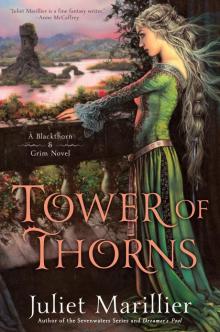 Tower of Thorns
Tower of Thorns Shadowfell
Shadowfell Wolfskin
Wolfskin The Caller
The Caller Foxmask
Foxmask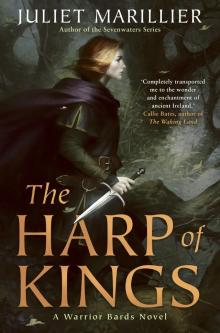 Harp of Kings
Harp of Kings The Well of Shades
The Well of Shades Heart's Blood
Heart's Blood Child of the Prophecy
Child of the Prophecy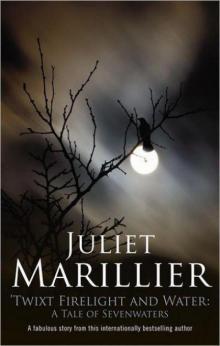 Twixt Firelight and Water
Twixt Firelight and Water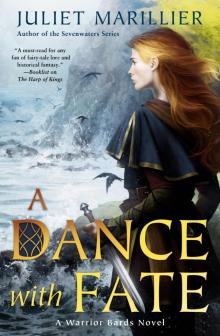 A Dance with Fate
A Dance with Fate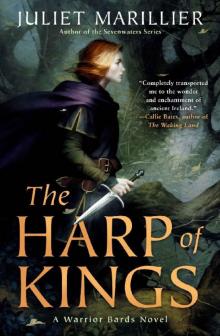 The Harp of Kings (Warrior Bards)
The Harp of Kings (Warrior Bards)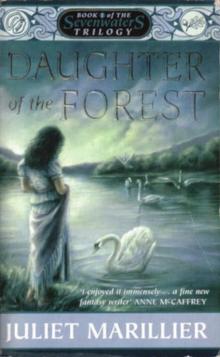 Daughter of the Forest (The Sevenwaters Trilogy)
Daughter of the Forest (The Sevenwaters Trilogy)![Sevenwaters [06] Flame of Sevenwaters Read online](http://i1.bookreadfree.com/i2/04/08/sevenwaters_06_flame_of_sevenwaters_preview.jpg) Sevenwaters [06] Flame of Sevenwaters
Sevenwaters [06] Flame of Sevenwaters![[Sevenwaters 04] Heir to Sevenwaters Read online](http://i1.bookreadfree.com/i2/04/12/sevenwaters_04_heir_to_sevenwaters_preview.jpg) [Sevenwaters 04] Heir to Sevenwaters
[Sevenwaters 04] Heir to Sevenwaters